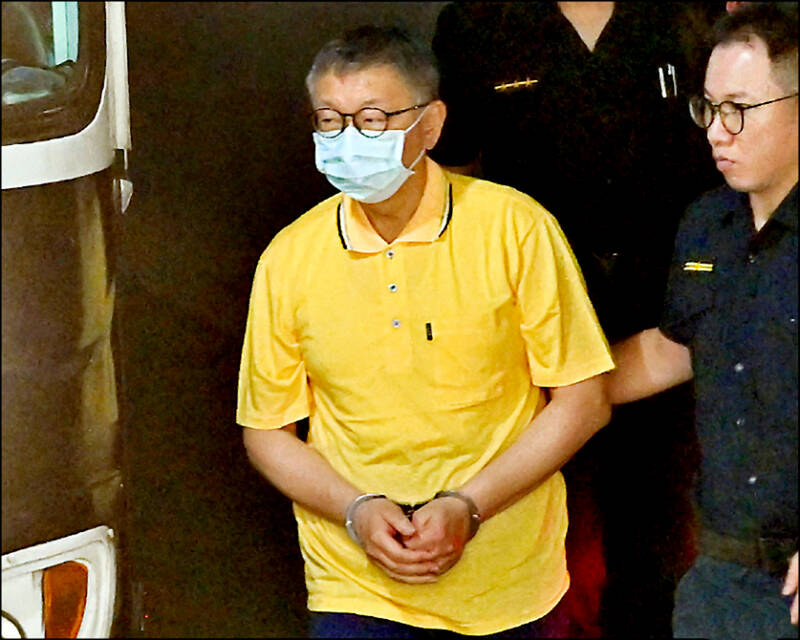Taipei prosecutors yesterday questioned Core Pacific Group chairman Sheen Ching-jing (沈慶京) and Chinese Nationalist Party (KMT) Taipei City Councilor Angela Ying (應曉薇) again, along with other witnesses, in a widening probe into allegations of corruption against Taiwan People’s Party Chairman Ko Wen-je (柯文哲).
Prosecutors are trying to map out a money trail to determine whether it involved and had directly or indirectly benefited Ko.
Ko is suspected of receiving kickbacks from Sheen during his tenure as Taipei mayor, with his administration approving in 2022 Sheen’s Core Pacific City redevelopment project.

Photo: Tu Chien-rong, Taipei Times
Company ledgers show that Sheen had allocated a total of NT$430 million (US$13.4 million at the current exchange rate) for the project’s publicity expenses: one for NT$180 million and another for NT$250 million, KMT Taipei City Councilor Chung Hsiao-ping (鍾小平) and his DPP colleague Chien Shu-pei (簡舒培) said.
Chung said he had received tip-offs that the NT$430 million went to pay lobbyists, politicians, government officials and councilors who lobbied or pushed the project.
Ko was among those who allegedly received money from the fund, Chung said.
Sheen allegedly transferred NT$45 million to foundations controlled by Ying, as she had “pressured” city officials to approve a proposal to raise the project’s floor area ratio to 840 percent, which would allow Core Pacific Group to reap more than NT$40 billion in extra financial gains, Chung said.
Chien said that a USB flash drive seized by investigators at Ko’s residence on Aug. 31 included an entry “Sheen Ching-jing, 1,500 2022/11/1,” which could be interpreted as NT$15 million from Sheen on Nov. 1, 2022.
That could be the amount of money Ko received a month after the project’s approval, Chien said.
Another entry around that time showed NT$25 million “from undetermined origins” going to an organization headed by Ko called the Taiwan Public Service Foundation, which could be another conduit for Sheen to pay kickbacks to Ko, Chien said.
Investigators have also found that Ko and his wife, Peggy Chen (陳佩琪), had received NT$6.19 million in cash from unknown sources, and that Chen had deposited the money through multiple ATM transactions near their residence in Taipei, she said.
Chien said that the cash deposit transactions were uncovered by Taipei prosecutors, with the money being deposited to the accounts of Ko’s wife and their three children.
Chien accused the former mayor and his wife of accepting money from business group bosses, either as bribes, kickbacks or possibly for money laundering.
Ko was listed as a suspect in May when Taipei prosecutors launched its corruption probe, in connection with the Core Pacific City redevelopment project, and other construction and public procurement projects when Ko was mayor.
Ko has been placed in detention with restricted communication after questioning. Sheen, Ying and two other suspects are also in detention.
Prosecutors yesterday also questioned two new witnesses — former Taipei deputy mayor Lin Chin-jung (林欽榮), and another city government official. Lin was released without bail in the afternoon.

Taiwan has received more than US$70 million in royalties as of the end of last year from developing the F-16V jet as countries worldwide purchase or upgrade to this popular model, government and military officials said on Saturday. Taiwan funded the development of the F-16V jet and ended up the sole investor as other countries withdrew from the program. Now the F-16V is increasingly popular and countries must pay Taiwan a percentage in royalties when they purchase new F-16V aircraft or upgrade older F-16 models. The next five years are expected to be the peak for these royalties, with Taiwan potentially earning

STAY IN YOUR LANE: As the US and Israel attack Iran, the ministry has warned China not to overstep by including Taiwanese citizens in its evacuation orders The Ministry of Foreign Affairs (MOFA) yesterday rebuked a statement by China’s embassy in Israel that it would evacuate Taiwanese holders of Chinese travel documents from Israel amid the latter’s escalating conflict with Iran. Tensions have risen across the Middle East in the wake of US and Israeli airstrikes on Iran beginning Saturday. China subsequently issued an evacuation notice for its citizens. In a news release, the Chinese embassy in Israel said holders of “Taiwan compatriot permits (台胞證)” issued to Taiwanese nationals by Chinese authorities for travel to China — could register for evacuation to Egypt. In Taipei, the ministry yesterday said Taiwan

Taiwan is awaiting official notification from the US regarding the status of the Agreement on Reciprocal Trade (ART) after the US Supreme Court ruled US President Donald Trump's global tariffs unconstitutional. Speaking to reporters before a legislative hearing today, Premier Cho Jung-tai (卓榮泰) said that Taiwan's negotiation team remains focused on ensuring that the bilateral trade deal remains intact despite the legal challenge to Trump's tariff policy. "The US has pledged to notify its trade partners once the subsequent administrative and legal processes are finalized, and that certainly includes Taiwan," Cho said when asked about opposition parties’ doubts that the ART was

If China chose to invade Taiwan tomorrow, it would only have to sever three undersea fiber-optic cable clusters to cause a data blackout, Jason Hsu (許毓仁), a senior fellow at the Hudson Institute and former Chinese Nationalist Party (KMT) legislator, told a US security panel yesterday. In a Taiwan contingency, cable disruption would be one of the earliest preinvasion actions and the signal that escalation had begun, he said, adding that Taiwan’s current cable repair capabilities are insufficient. The US-China Economic and Security Review Commission (USCC) yesterday held a hearing on US-China Competition Under the Sea, with Hsu speaking on